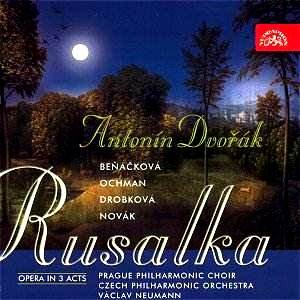Rusalka
is Dvořák’s operatic masterpiece, since it brings together
all his stylistic features. The libretto, by Jaroslav Kvapil,
was a reworking of Hans Christian Andersen's ‘Little Mermaid’,
and it allowed the composer to combine set pieces with an onward
flow of drama. The music has much in common with his symphonic
poem The Water Sprite, which is hardly surprising since
rusalki were water creatures. Structurally this is Dvořák's
most cohesive opera.
Neumann
and his Czech forces made their recording twenty years ago in
the Rudolfinum, their splendid hall on the bank of the Vltava.
The acoustic is ambient and pleasing on these discs, just as it
is at a live performance, so that soloists, orchestra and chorus
are heard to satisfying effect. In short, this is one of the best
recordings Supraphon has given us as far as sound quality is concerned.
The
score contains several fine set pieces, none of them better than
Rusalka's famous Invocation to the Moon, which occurs in
Act I. The leading soprano Gabriela Benacková delivers
this magnificently, and moreover sings in excellent voice throughout.
She perhaps lacks the special tenderness of her equivalent in
the rival Mackerras recording (Decca), Renée Fleming, but
she gains in respect of her more idiomatic control of the text.
This point may be made more strongly still of Vera Soukupová's
magnificently life-like rendition of the witch Jezibaba, for whom
Dvořák created some of his most distinctive music. The part
suits her vocal range and low register admirably.
Of
the other singers, Wieslaw Ochman has a suitably heroic, ringing
tone as the Prince, and he controls and shapes his phrasing with
great sensitivity. Richard Novák in the role of the Watersprite
achieves a dramatic characterisation, though his vocal control
is more 'on the edge'. His dark tone and menacing characterisation
work very well though.
The
work of the Prague Philharmonic Chorus has great vitality and
incisiveness, the standard set in the opening scene, while the
Czech Philharmonic Orchestra play with their customary high standards
(they feature on the Mackerras set too). The percussion makes
a particularly exciting effect in the dance numbers which help
give the score a distinctive national flavour.
There
is little to choose between these two excellent performances,
but on balance the more intense conviction of Mackerras's conducting,
and the special sensitivity of Renée Fleming give their
version a slight edge. But to imply that the Neumann recording
is anything less than first rate would be unfair. It comes with
full text and translation, though the chosen font is not the easiest
to read on glossy paper.
Terry
Barfoot
